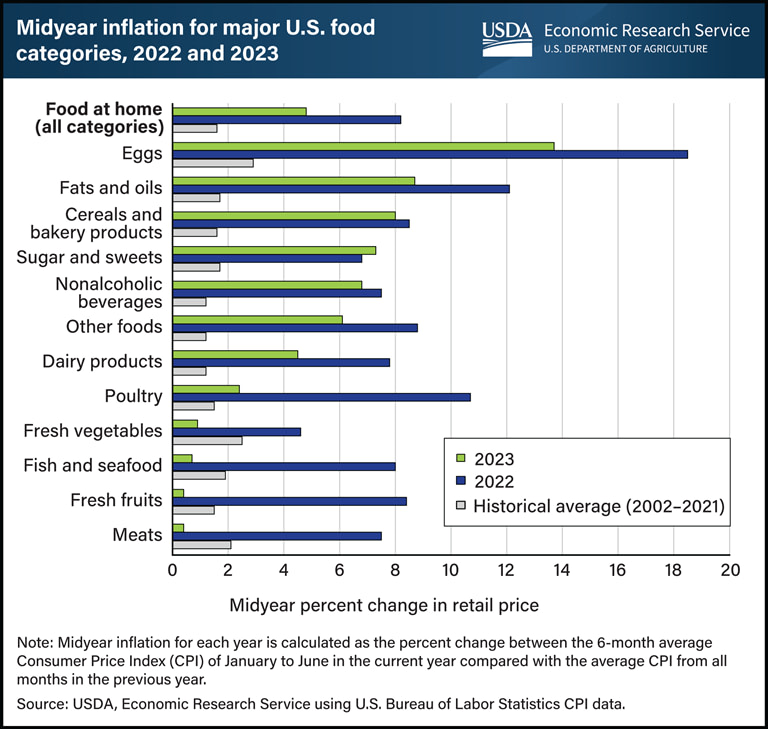Meals is without doubt one of the most seen objects within the common American price range. We eat every day and store for meals continuously. Groceries are additionally one of many extra versatile objects in a price range: you may’t change your lease or automotive fee, however you may shift your grocery buying patterns. Let’s look nearer on the common price of groceries and the way it varies with location, revenue, and household dimension.
Groceries are normally outlined as meals objects which might be ready and consumed within the residence. Cash spent on consuming out or ordering out doesn’t qualify. Consumable objects typically bought in grocery shops, like cleansing provides and private hygiene objects, might also be categorised as groceries.
Common Month-to-month Meals Spending
Right here’s a breakdown of the typical American month-to-month spending sample. Meals is the third largest expense, however it’s not damaged down into groceries and meals ready outdoors the house.
Meals spending contains groceries and meals away from residence, which is any meals that you simply pay another person to organize for you. On common, People spent $779 per 30 days on meals in 2022 and $9,343 over the complete yr. Right here’s how that breaks down.
How A lot Does an Common American Spend on Groceries Every Month?
When contemplating solely grocery bills, the typical American spends about $475 month-to-month and a complete of $5,703 all year long.
💳 Be taught extra: Maximize your financial savings on every day necessities with our information to the greatest bank cards for groceries.
How A lot Do People Have to Spend on Groceries
Are People spending greater than they should spend on groceries?
The US Division of Agriculture has created 4 meals plans that People can observe; the Thrifty Plan, the Low-cost Plan, the Average-cost Plan, and the Liberal Plan[1].
These plans think about the age and gender of an individual to calculate the typical meals price. The plans are constructed on the belief that every one meals are cooked at residence and meet dietary suggestions. Figures are up to date frequently to account for inflation.
Listed below are the typical meals prices listed within the December 2023 USDA Meals Plan[2,3]:
The common month-to-month grocery invoice of a household of two adults and one 5 yr previous little one within the US following the official USDA average meals plan is $898. That’s considerably increased than the typical family meals expenditure of $779. The disparity is as a result of many American households don’t have youngsters, which brings down the typical expenditure.
US Census information signifies that the typical household family dimension is 3.2 folks, whereas the typical non-family family dimension is just one.25 folks. The common meals expenditure isn’t damaged down by household and non-family households, however household households could have considerably increased meals expenditures than non-family households.
Increased Revenue Earners Spend Extra on Groceries
Revenue has a significant affect on grocery spending. Unsurprisingly, a better revenue rolls out a smorgasbord of choices. Folks with increased incomes can afford to pay extra for natural produce, imported meals, and gourmand objects[4].
Low incomes additionally affect general decisions. In line with a 2019 research, lower-income households buy fewer wholesome meals like greens and dairy merchandise than households with a better revenue. The research famous that “lower-income households had decrease (poorer vitamin high quality) scores in contrast with higher-income households”.
Low-income households additionally pay extra for the meals they purchase. Shoppers can save vital quantities by shopping for non-perishable objects in bulk, however a tighter price range places money-saving bulk purchases out of attain. Low-income households store on-line much less continuously, and so they have much less entry to giant grocery shops with aggressive pricing.
How Has the Price of Groceries Modified Over the Years?
Common meals expenditures for each meals ready at residence and meals ordered outdoors the house have elevated steadily for a few years, with a very sharp bounce in the course of the excessive inflation interval of 2022[4].
Meals costs elevated sharply in the course of the inflation surge in 2022. Meals worth inflation abated considerably in 2023 however was nonetheless properly above historic averages.


Egg and poultry costs had been hit by an outbreak of Extremely Pathogenic Avian Influenza (HPAI). Egg costs had the biggest worth improve (32.2%) between 2021 and 2022 of any class tracked by USDA. Beef and veal costs elevated the least (5.3%) between 2021 and 2022 and usually declined from peak costs in November 2021.
The USDA predicts that food-at-home costs will drop 0.6% in 2024, with food-away-from-home costs forecast to rise 4.9%[5].
The Common Price of Groceries by State
The common price of groceries varies significantly by state. Hawaii and Alaska sometimes see the highest prices, as many items need to be shipped over giant distances[6].
Conclusion
Revenue is a elementary issue influencing family spending on groceries. Increased revenue permits households to allocate more cash for meals and different bills. Excessive-income households could have the flexibleness to decide on premium and natural merchandise, contributing to a better general grocery invoice.
Decrease-income households typically face price range constraints, main them to make cost-conscious decisions. Dietary decisions, cultural preferences, and life-style selections affect the kinds of meals objects folks buy.
Family grocery spending is a posh end result influenced by a mixture of things, together with revenue, demographic traits, location, preferences, financial circumstances, and exterior occasions. Understanding these elements helps policymakers, companies, and people make knowledgeable selections about budgeting, useful resource allocation, and responding to dynamic market circumstances.
The content material on finmasters.com is for academic and informational functions solely and shouldn’t be construed as skilled monetary recommendation. Finmasters isn’t a monetary establishment and doesn’t present any monetary services or products. We attempt to supply up-to-date info however make no warranties relating to the accuracy of our info.




